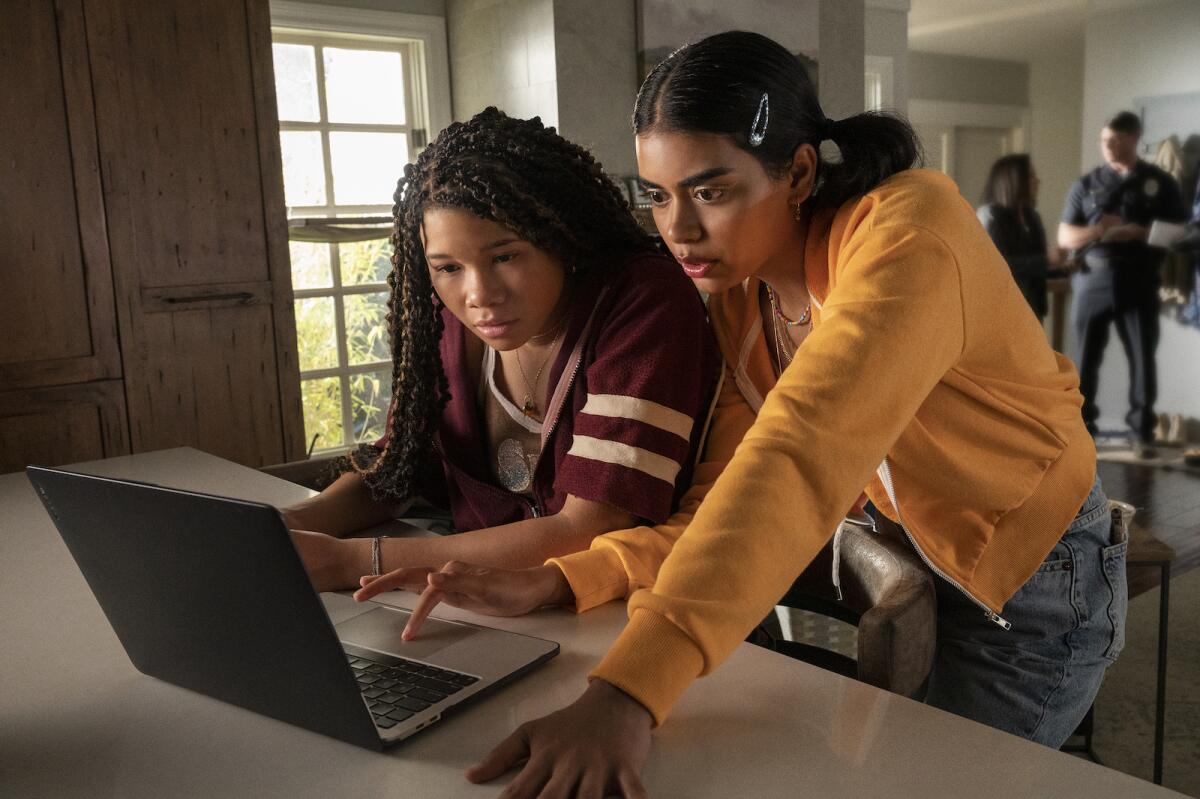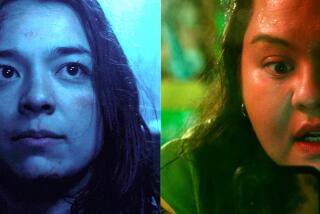Review: ‘Missing’ turns up more terrors in tech and true crime

In 2018, director Aneesh Chaganty and co-writer Sev Ohanian turned in a nifty little thriller, “Searching,” that comments on the way we live now, which is to say, online. In it, John Cho searches for his missing daughter through her digital detritus, parsing clues in plain sight. The entirety of the film took place on a computer screen, making use of the way cameras permeate our everyday existence, from FaceTime to surveillance video.
“Searching” was a critical and commercial success, and a follow-up, “Missing” — written and directed by Nick Johnson and Will Merrick, with a story by Chaganty and Ohanian — hits theaters this week. This time, it’s a parent that’s gone missing, and as the daughter searches for her mother, she turns up a whole host of new terrors and triumphs of tech and true crime.
For your safety
The Times is committed to reviewing theatrical film releases during the COVID-19 pandemic. Because moviegoing carries risks during this time, we remind readers to follow health and safety guidelines as outlined by the CDC and local health officials.
Johnson and Merrick use the format set by “Searching,” but the technological, cultural and media landscape has evolved, including the fire hose of streaming true crime content. The only time the camera is ever liberated from the laptop screen is during fake-out re-creations from a Netflix true crime series called “Unfiction.” There’s also the proliferation of TikTok detectives and Twitter police performing armchair analysis on every missing person case.
If you’ve seen “Searching,” you’ll probably have an inkling that the answer will be planted in front of filmgoers, but “Missing” takes some absolutely wild and crazy twists and turns in arriving at its destination. College-bound June (Storm Reid), 18, just wants to rage with her friends while her mom, Grace (Nia Long), is on vacation in Colombia with her new boyfriend, Kevin (Ken Leung). But when a hungover June rolls into LAX to pick them up a week later, Grace and Kevin are no-shows.
Relying on her impressive Google skills, innate to a digitally native member of Gen Z, June starts searching for her missing mom, combing through tourist live cams, bank statements and hiring a TaskRabbit-type helper, Javi (Joaquim de Almeida), to do footwork in Colombia. June is smart, resourceful and bold, and the way she cracks passwords and navigates the maze of information will make anyone think deeply about how much data tracking one should leave toggled on in their Google account. Is it better to leave a trace? Depends on what you’re doing.
The suspenseful “Missing” plows through nearly two hours of shocking plot twists at a breakneck pace. And while it’s entertaining to be sure, it also takes on a somber tone as it reckons with grief, loss and intimate partner violence in a way that’s very real, backed up by headlines ripped from the news, and yes, those true crime series and TikToks that are so very compelling.
That’s what makes movies like “Searching” and “Missing” so captivating. They’re not only high-concept thrillers featuring melodramatic acting (Reid is a likable presence, but it’s doubtful she’ll snag an Independent Spirit Award nomination the way Cho did) but they also feel authentic to the way we live, even in the outlandish moments.
We experience so much of our reality online, unknowingly scattering artifacts of our lived experience as we click and swipe. But “Searching” and “Missing” reiterate that despite the pictures, videos, the bread crumbs of humanity reflected in zeroes and ones, there’s nothing like the real thing, for better, or for worse.
Walsh is a Tribune News Service film critic.
‘Missing’
Rated: PG-13, for some strong violence, language, teen drinking and thematic material
Running time: 1 hour, 51 minutes
Playing: Starts Jan. 20 in general release
More to Read
Only good movies
Get the Indie Focus newsletter, Mark Olsen's weekly guide to the world of cinema.
You may occasionally receive promotional content from the Los Angeles Times.










